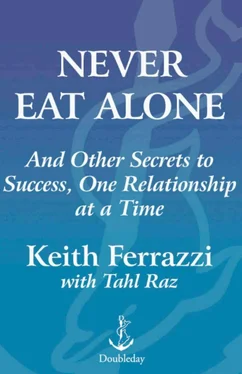Keith Ferrazzi - Never Eat Alone
Здесь есть возможность читать онлайн «Keith Ferrazzi - Never Eat Alone» весь текст электронной книги совершенно бесплатно (целиком полную версию без сокращений). В некоторых случаях можно слушать аудио, скачать через торрент в формате fb2 и присутствует краткое содержание. Год выпуска: 2005, ISBN: 2005, Издательство: C U R R E N C Y • D O U B L E D A Y, Жанр: marketing, на английском языке. Описание произведения, (предисловие) а так же отзывы посетителей доступны на портале библиотеки ЛибКат.
- Название:Never Eat Alone
- Автор:
- Издательство:C U R R E N C Y • D O U B L E D A Y
- Жанр:
- Год:2005
- ISBN:0-385-51529-4
- Рейтинг книги:4 / 5. Голосов: 1
-
Избранное:Добавить в избранное
- Отзывы:
-
Ваша оценка:
- 80
- 1
- 2
- 3
- 4
- 5
Never Eat Alone: краткое содержание, описание и аннотация
Предлагаем к чтению аннотацию, описание, краткое содержание или предисловие (зависит от того, что написал сам автор книги «Never Eat Alone»). Если вы не нашли необходимую информацию о книге — напишите в комментариях, мы постараемся отыскать её.
Never Eat Alone — читать онлайн бесплатно полную книгу (весь текст) целиком
Ниже представлен текст книги, разбитый по страницам. Система сохранения места последней прочитанной страницы, позволяет с удобством читать онлайн бесплатно книгу «Never Eat Alone», без необходимости каждый раз заново искать на чём Вы остановились. Поставьте закладку, и сможете в любой момент перейти на страницу, на которой закончили чтение.
Интервал:
Закладка:
Most important, I learned that arrogance is a disease that can betray you into forgetting your real friends and why they're so important. Even with the best of intentions, too much hubris will stir up other people's ire and their desire to put you in your place. So remember, in your hike up the mountain, be humble. Help others up the mountain along with and before you. Never let the prospect of a more powerful or famous acquaintance make you lose sight of the fact that the most valuable connections you have are those you've already made at all levels. I reach back into my past regularly to touch base with the folks who have meant so much to me since I was a kid. I go out of my way to tell the early mentors what they meant to me and how much they were responsible for my success today.
29. Find Mentors, Find Mentees, Repeat
To teach is to learn again.
— H. J. BROWNGreat musicians know it. So do professional athletes and world-class CEOs. Successful people in nearly every field know that they can't be their best unless they have a good coach in their corner. And now the business world knows it, too: In a fastpaced, fluid, and dynamic environment, where flattened organizations made up of cross-functional teams must respond rapidly to change, mentoring is one of the most effective strategies to get the best out of each and every individual.
Many companies have developed formal mentoring programs with the idea that sharing what you know and learning what others have to teach is just smart management. At FerrazziGreenlight, we have worked with many companies to create such formal programs with the idea that helping employees build relationships for career success reduces turnover and ultimately leads to stronger external relationships for revenue growth as well. One of the more historically successful programs was established in 1997 at one of Intel's largest chip-making facilities in New Mexico.
The people responsible for developing that program wanted to go beyond the traditional notion of mentoring as a one-way process that teamed seasoned executives with ambitious up-andcomers. To the people at Intel, organization-wide mentoring meant creating an inclusive learning network matching people not by job title or by seniority but by specific skills that are in demand. The company uses an intranet site and e-mail to break down departmental barriers and create partnerships between two people who can teach each other different valuable skills that they need to be better employees. The system enables Intel to spread best practices quickly throughout the global organization and develop the best and brightest employees in the industry.
While it's wonderful the business world is finally catching on, mentoring—a lifelong process of giving and receiving in a neverending role as both master and apprentice—has always been the Holy Grail for those who love to connect people with people.
No process in history has done more to facilitate the exchange of information, skills, wisdom, and contacts than mentoring. Young men and women learned their trade by studying as apprentices under their respective craftsmen. Young artists developed their individual style only after years working under elder masters. New priests apprenticed for a decade or more with older priests to become wise religious men themselves. When finally these men and women embarked on their own, they had the knowledge and the connections to succeed in their chosen field.
By studying the lives of those who know more than we do, we expand our horizons. As a child, I realized that many of the opportunities other kids had that would expose them to new things and new people, like summer camp or extra tutoring, were unavailable to me. I quickly learned that success in my life would require determination, exploration, self-reliance, and a strong will. I also learned to rely on other people who were available: my father and some of the more professional people he knew in our neighborhood.
My mom and dad instructed me to observe how the most successful people we knew worked and talked and lived. My parents told me I could learn how to live my life by watching others live their lives. My dad, of course, did all he could to nurture and teach me what he knew. But he wanted me to know more than that; like most fathers, he wanted me to be more than he was. He gave me the confidence I needed to go out, without pride or insecurity, and develop relationships with the men and women he knew whom he respected.
Perhaps the value he placed on mentors came from Damon Runyon, one of my father's favorite authors. A tough guy who dropped out of school by the sixth grade and bootstrapped his way to success, Runyon's tough-luck stories about equally tough characters had a lot of emotional resonance for my dad. His favorite quote of Runyon's was "Always try to rub up against money, for if you rub up against money long enough, some of it may rub off on you." No surprise, then, that my dad wanted me rubbing up against people with more money, more knowledge, and more skills than he had.
Before I was even ten years old, I remember him encouraging me to bike down our dusty driveway to hang out with our neighbors. By the time I was in grade school, I had reached out to George Love, the father of one of my friends and a local attorney. Dad would take me to see Walt Saling, a stockbroker, every so often just to visit. I'd sit close by and pepper Walt with questions about his job and the people he worked with. When I came home from prep school, Dad and I would go on our "rounds." We'd go visit those people Dad thought I'd learn something from: Toad and Julie Repasky, who owned the local cement plant and whom Dad used to work for, or the Fontanella sisters, who used to tutor me in Latin and math when I was growing up. These men and women of our town were the celebrities for our working-class family. They were professionals with a good education, and that meant they had something to teach.
The fact is, from my father's perspective, everyone had something to offer. When he'd go out for his weekly sit-down at a local diner with his friends, he took me along. He wanted me to be comfortable with older, more experienced people and to never fear seeking their help or asking them questions. When my dad would show up with me in tow on a Friday night, his buddies would say, "Here's Pete [my father's name] and Re-Pete [my nickname to his buddies]."
I look back on those times with so much gratitude and emotion. At every turn, and to this very day, I still try to connect with trailblazers, head honchos, and people who have experienced a different life than I've had.
My father and Runyon were onto something in a way, perhaps, that was even more profound than they imagined. Research now backs up their belief that whom you associate with is crucial to who you become. Dr. David McClelland of Harvard University researched the qualities and characteristics of high achievers in our society. What he found was that your choice of a "reference group," the people you hang out with, was an important factor in determining your future success or failure. In other words, if you hang with connected people, you're connected. If you hang with successful people, you're more likely to become successful yourself.
Let me explain how important mentoring became for me through an experience I had early on in my career. It was toward the end of the summer before my second year at business school. Deloitte and Touche, the accounting and consulting firm I had been interning with during that summer, was having its annual end-of-the-summer cocktail party for its interns from all around the country.
Off to the corner, amid all the clink of drinks and polite chatter, I saw a bunch of the partners and senior staff hanging around this big, gruff, white-haired guy who was holding court. Other interns stayed in their comfortable cliques, keeping their distance from their bosses, but I headed straight for the poobahs. It was, really, no different from riding my bike down the road to see the neighbors.
Читать дальшеИнтервал:
Закладка:
Похожие книги на «Never Eat Alone»
Представляем Вашему вниманию похожие книги на «Never Eat Alone» списком для выбора. Мы отобрали схожую по названию и смыслу литературу в надежде предоставить читателям больше вариантов отыскать новые, интересные, ещё непрочитанные произведения.
Обсуждение, отзывы о книге «Never Eat Alone» и просто собственные мнения читателей. Оставьте ваши комментарии, напишите, что Вы думаете о произведении, его смысле или главных героях. Укажите что конкретно понравилось, а что нет, и почему Вы так считаете.












